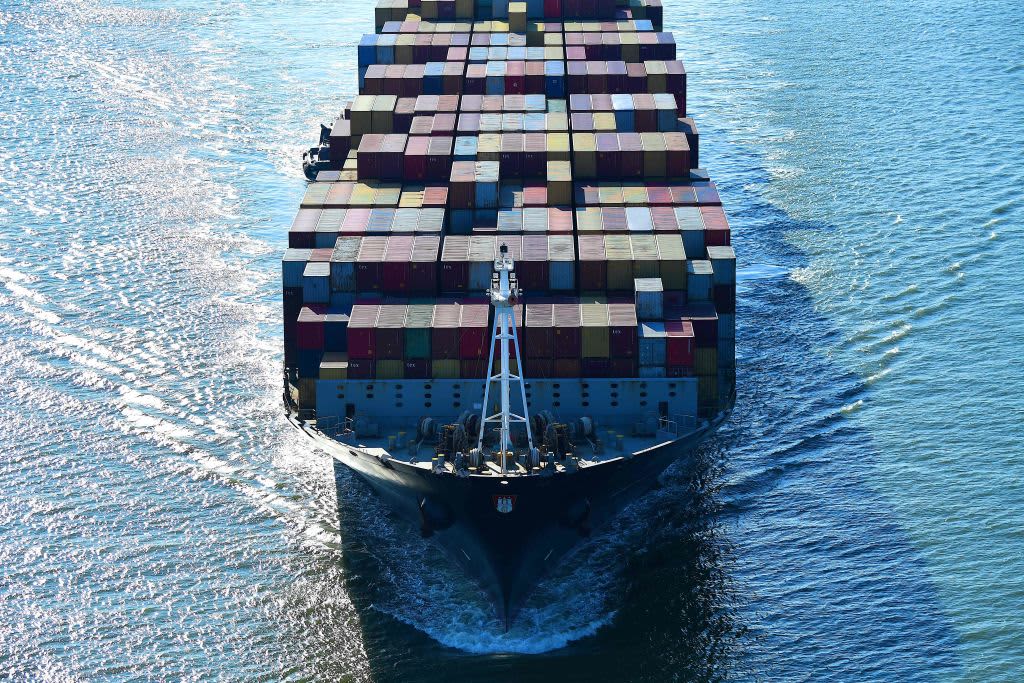
A container ship is seen from the Verrazzano-Narrows Bridge as it leaves New York on November 3, 2019.
Johannes Eisele | AFP | Getty Images
The International Chamber of Shipping is warning the global shipping community the lack of access to vaccines for seafarers will place the industry in a ‘legal minefield’ and leave global supply chains vulnerable, according to a legal document seen by CNBC which is expected to be published later this week.
In the document, ICS warns vaccinations could soon become a compulsory requirement for work at sea as countries begin to insist all crew members be vaccinated as a pre-condition of entering their ports.
In March, the Office of the Commissioner of the Ministry of Foreign Affairs of China in Hong Kong released a mandate that crew changes can only happen with those members that have had a Chinese Covid vaccine.
China is one of the popular crew-changing countries in the world. Without a vaccine, seafarers cannot leave the vessel and no crew change can happen. March is a key month for crew changes.
This is not the first time seafarers have been impacted by the pandemic. At the height of the Covid epidemic, 400,000 seafarers were stuck at sea. Time aboard the vessels was also greatly lengthened. The normal crew contract length for a seafarer is three to eleven months. The pandemic expanded that contract time to 18-plus months. There are currently 200,000 seafarers stuck at sea or at home waiting for a crew change, according to the ICS.
The seafarer workforce is considered to be one of the most diverse, internationalized workforces in the world.
“You can have 30 different nationalities on board a vessel at any one time,” explained Guy Platten, secretary general of the International Chamber of Shipping. “Half of shipping’s workforce resides in nations that will not have access to a vaccine for two or three years. ICS calculates that 900,000 of the world’s seafarers (well over half the global workforce) are from developing nations.”
Platten tells CNBC the lack of vaccination access for those seafarers is creating a ‘perfect storm’ for shipowners because the lack of a vaccinated workforce could force voyages to be canceled.
“We’re already seeing reports of countries requiring proof of Covid-19 vaccination for seafarers,” said Platten. “If our workers can’t pass through international borders, this will undoubtedly cause delays and disruptions in the supply chain.”
Bud Darr, executive vice president of maritime policy and government affairs at MSC Group, tells CNBC they are concerned the lack of vaccinations will become an obstacle to the free movement of seafarers this year.
“Seafarers have already given us so much,” said Darr. “Navigating quarantines, the suspension of flight routes, and health restrictions have kept them away from their family and friends,” said Darr. “All to keep the world supplied with essential goods.”
ICS warns the delays into ports caused by having an unvaccinated crew could open up legal liabilities for the vessel owners and added cost. The organization also said owners could open themselves up to legal liabilities if they tried to change existing contracts and require vaccines, or ask the crew to receive a specific vaccine as requested by a port. They did say the owner could address the need for seafarer vaccines in new contracts.
In order to circumvent these legal hurdles, the International Chamber of Shipping is reaching out to government maritime officials around the world for vaccination solutions. One would be the establishment of vaccine hubs across key international ports. In the United States, the Port of Los Angeles is being mentioned.
Darr says the shipping industry needs to find creative solutions to the problem.
“In the short term, this means getting seafarers vaccinations in their countries where there are established programs and sufficient supplies of vaccines,” he said. “In the long term, it’s about exploring the idea of public-private partnerships. There may even be the opportunity when the initial surge of need is met for national allocation, for manufacturers to provide vaccinations directly to shipowners to allocate/administer to these key workers.”




